Charles E W Bean, Diaries, AWM38 3DRL 606/244/1 - 1916 - 1933 - Part 9
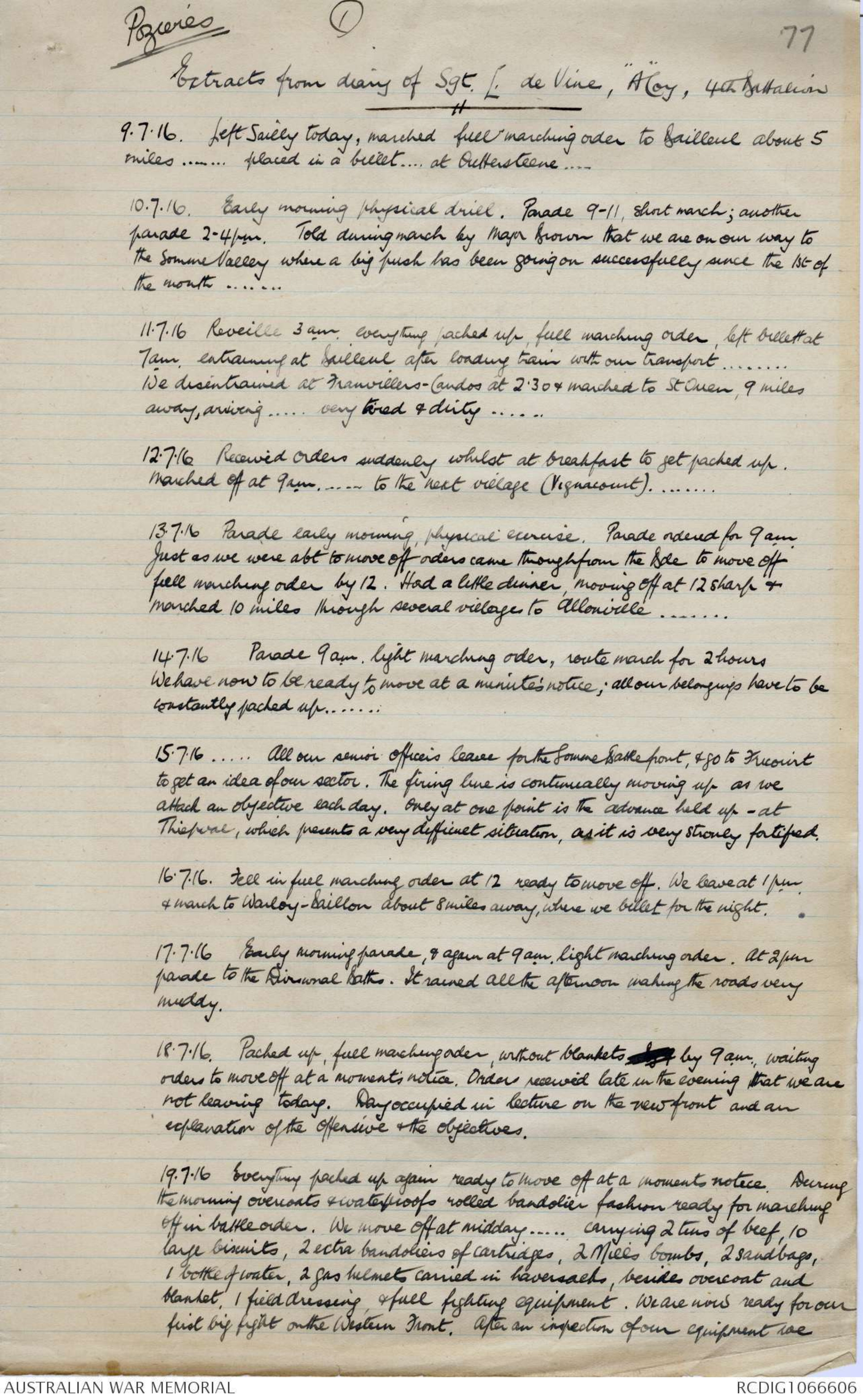
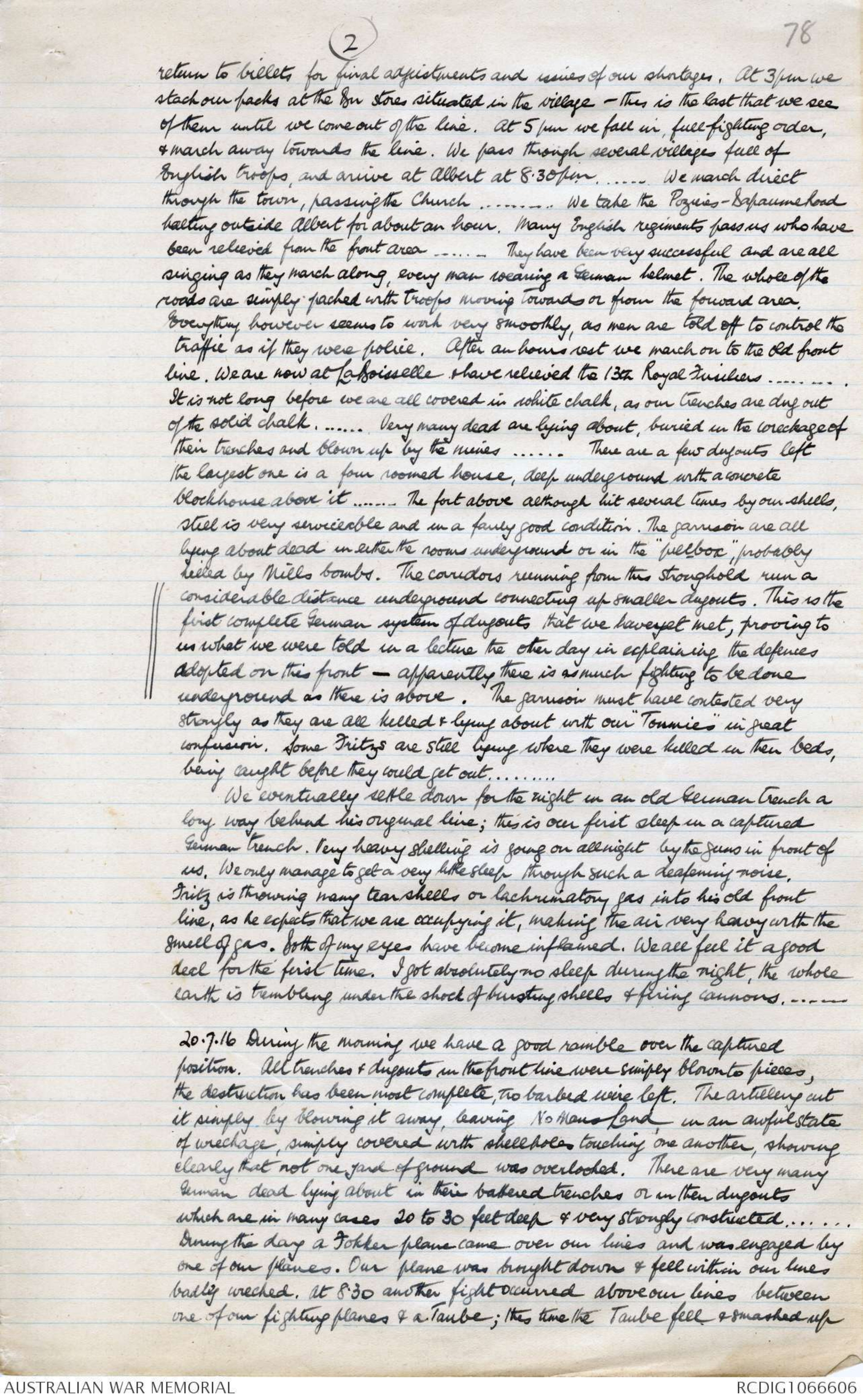
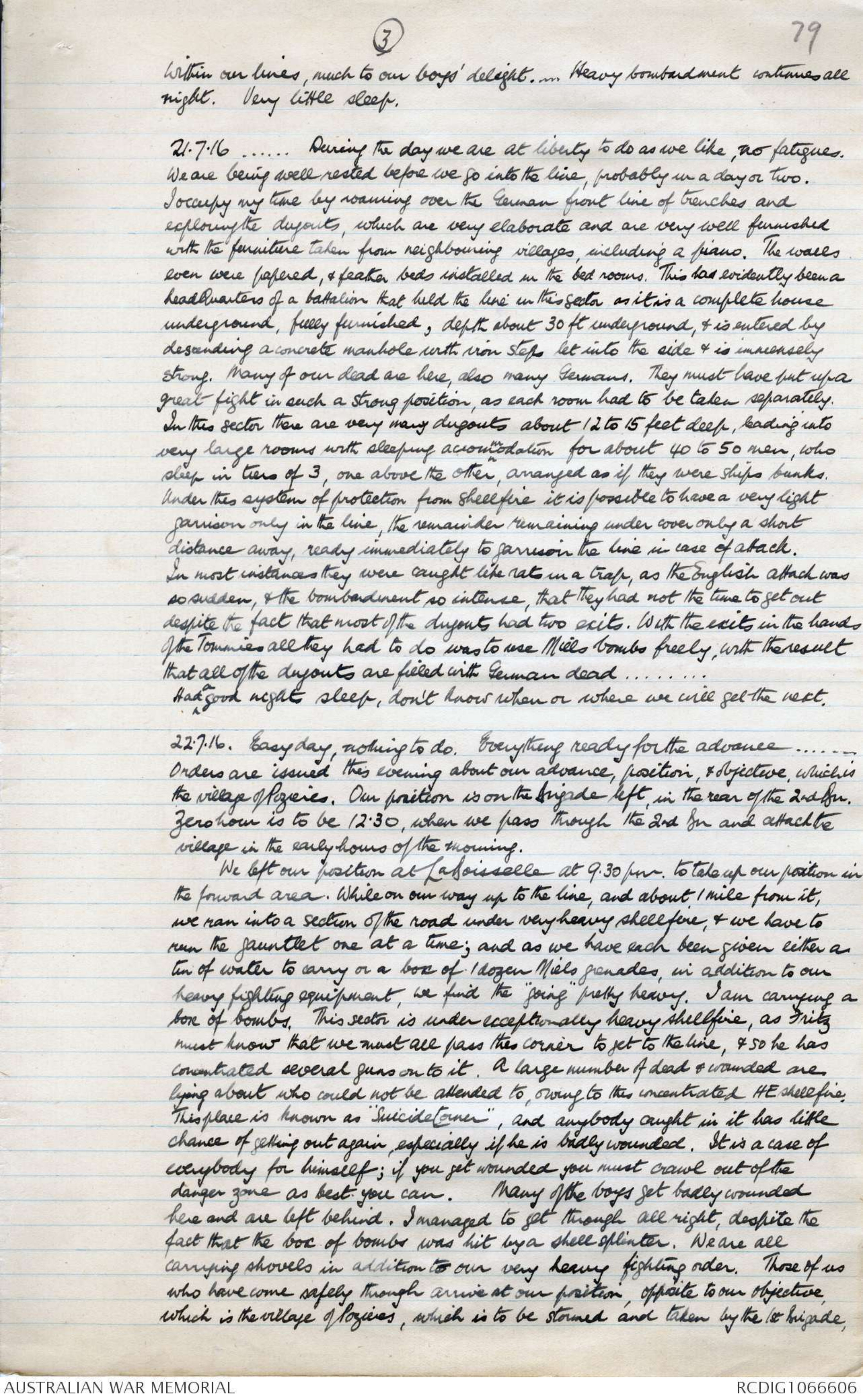
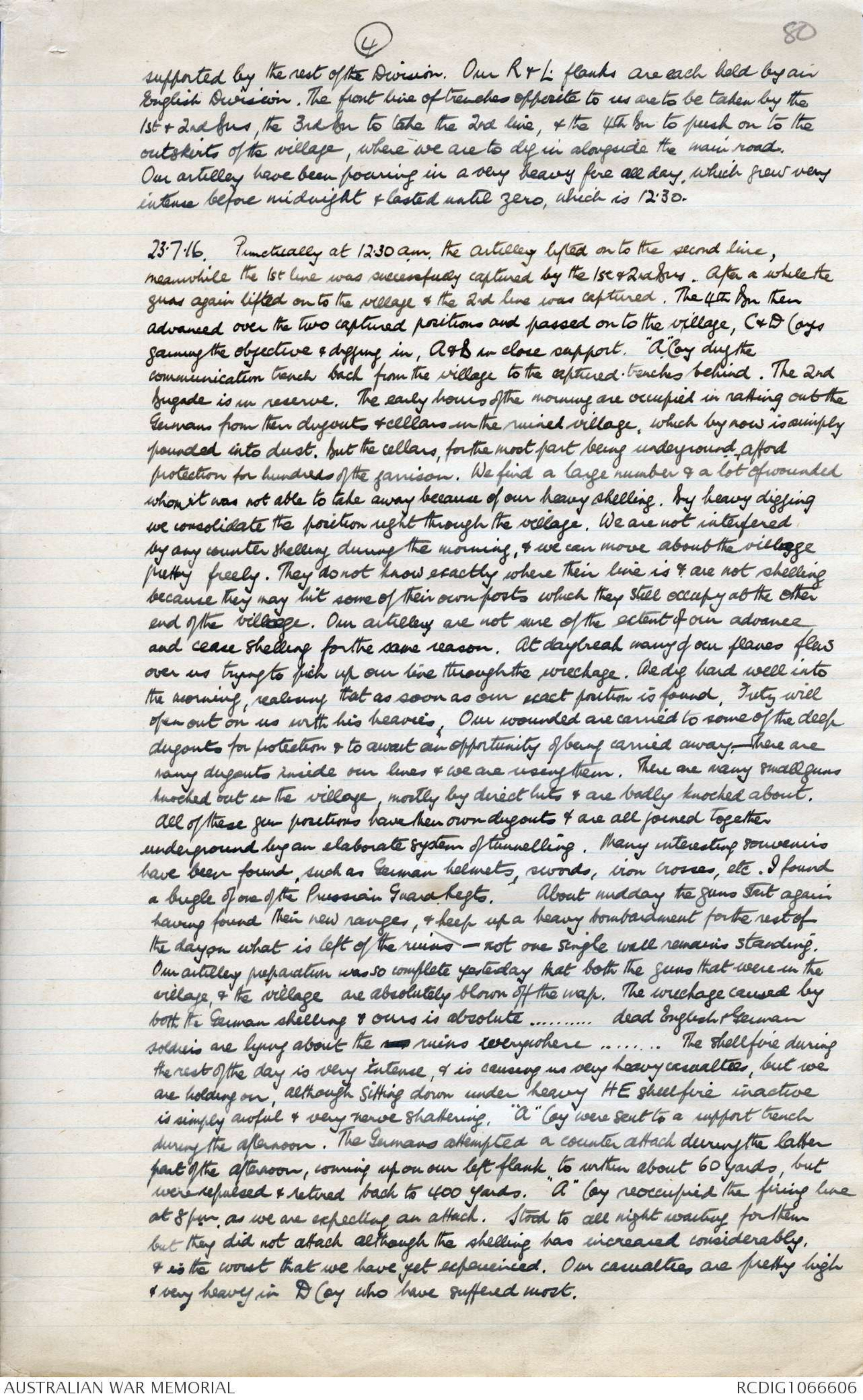
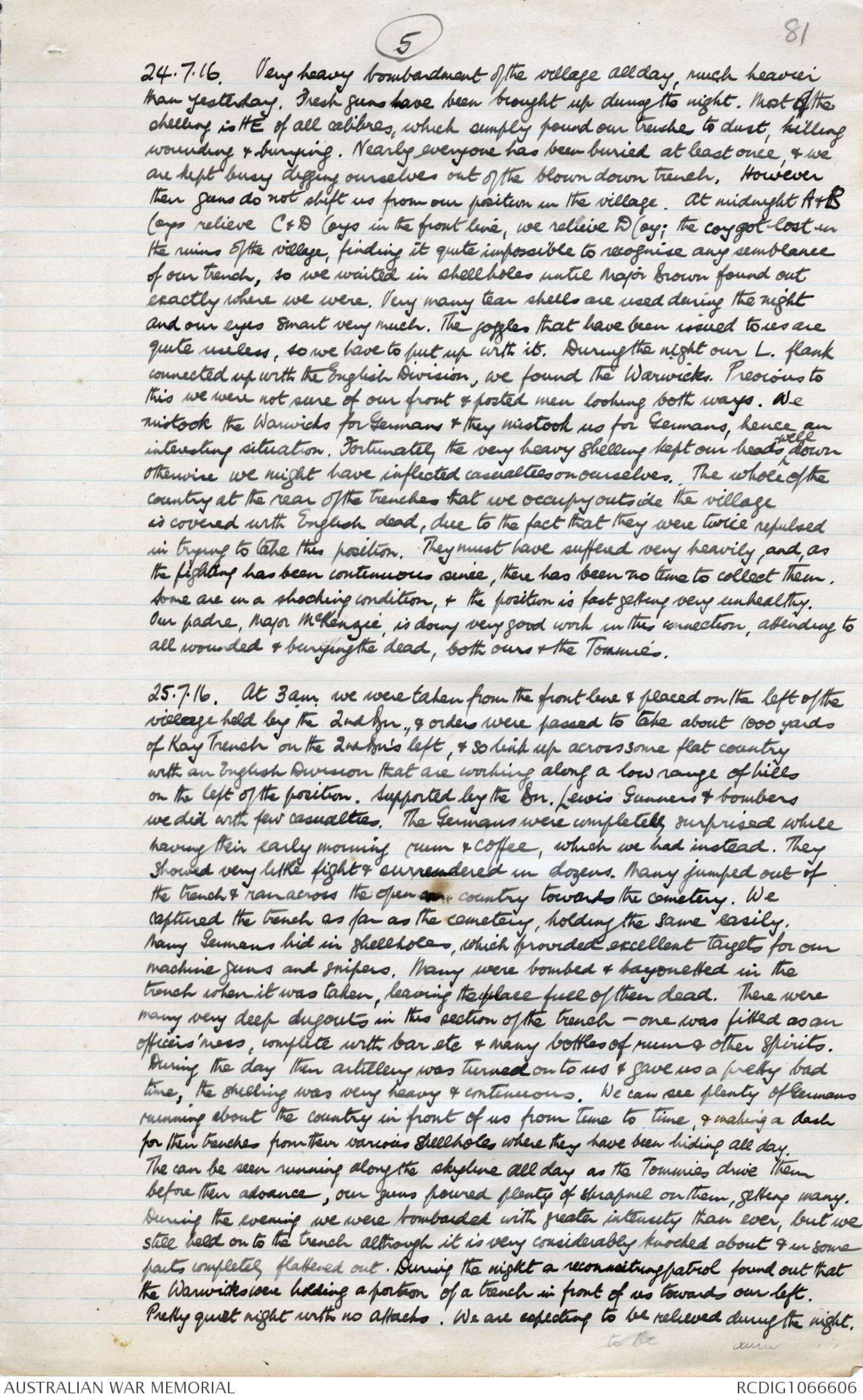
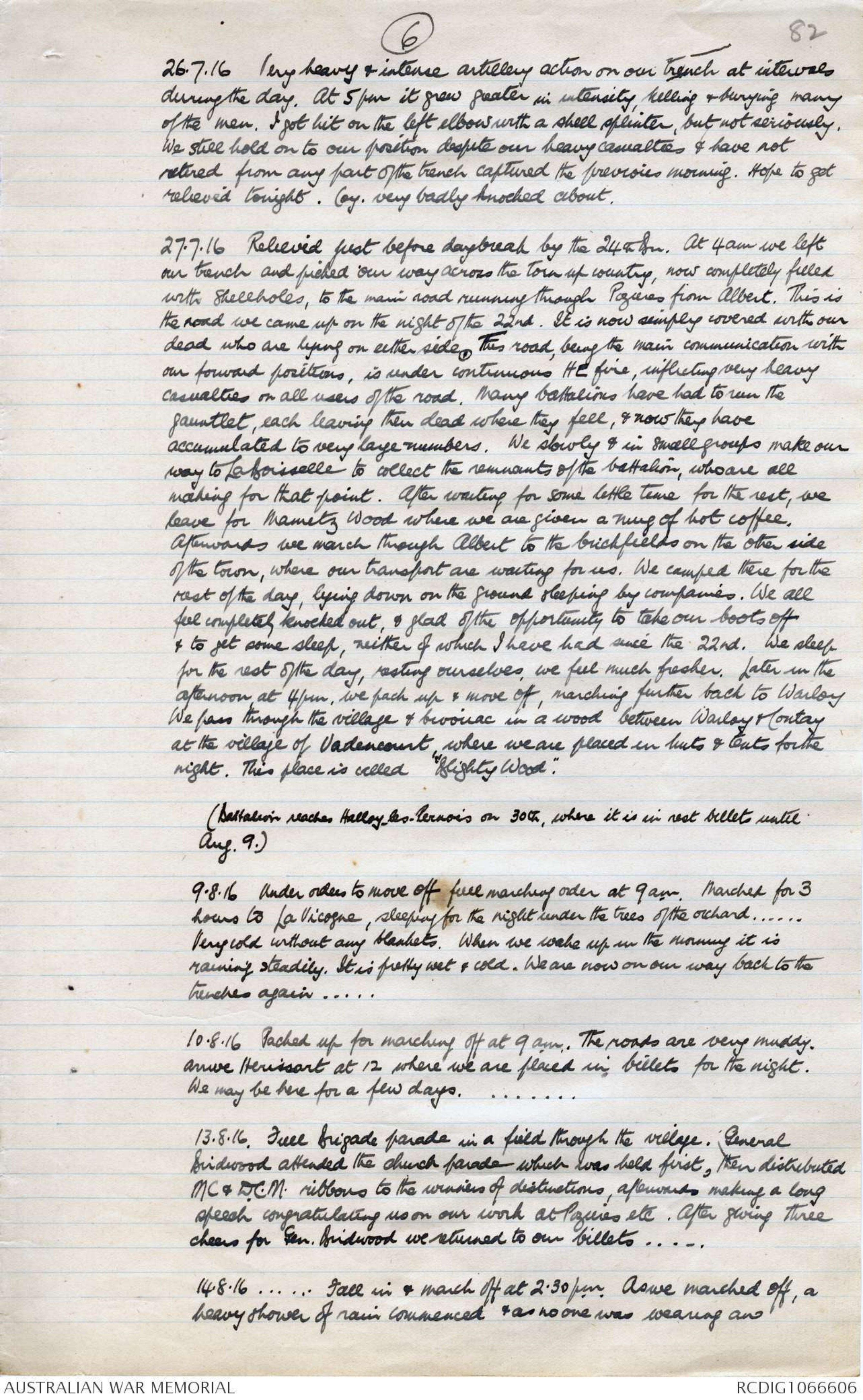
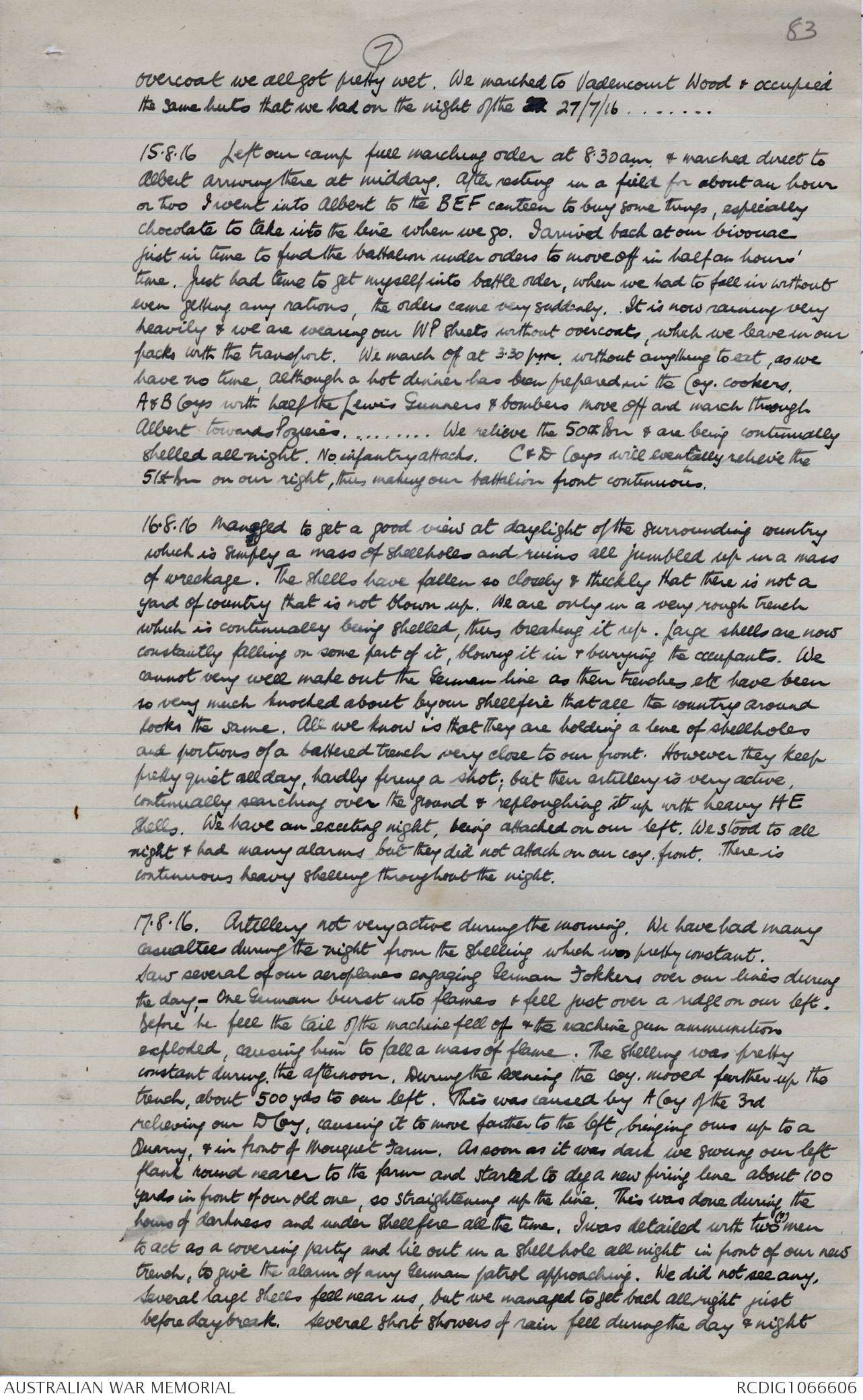
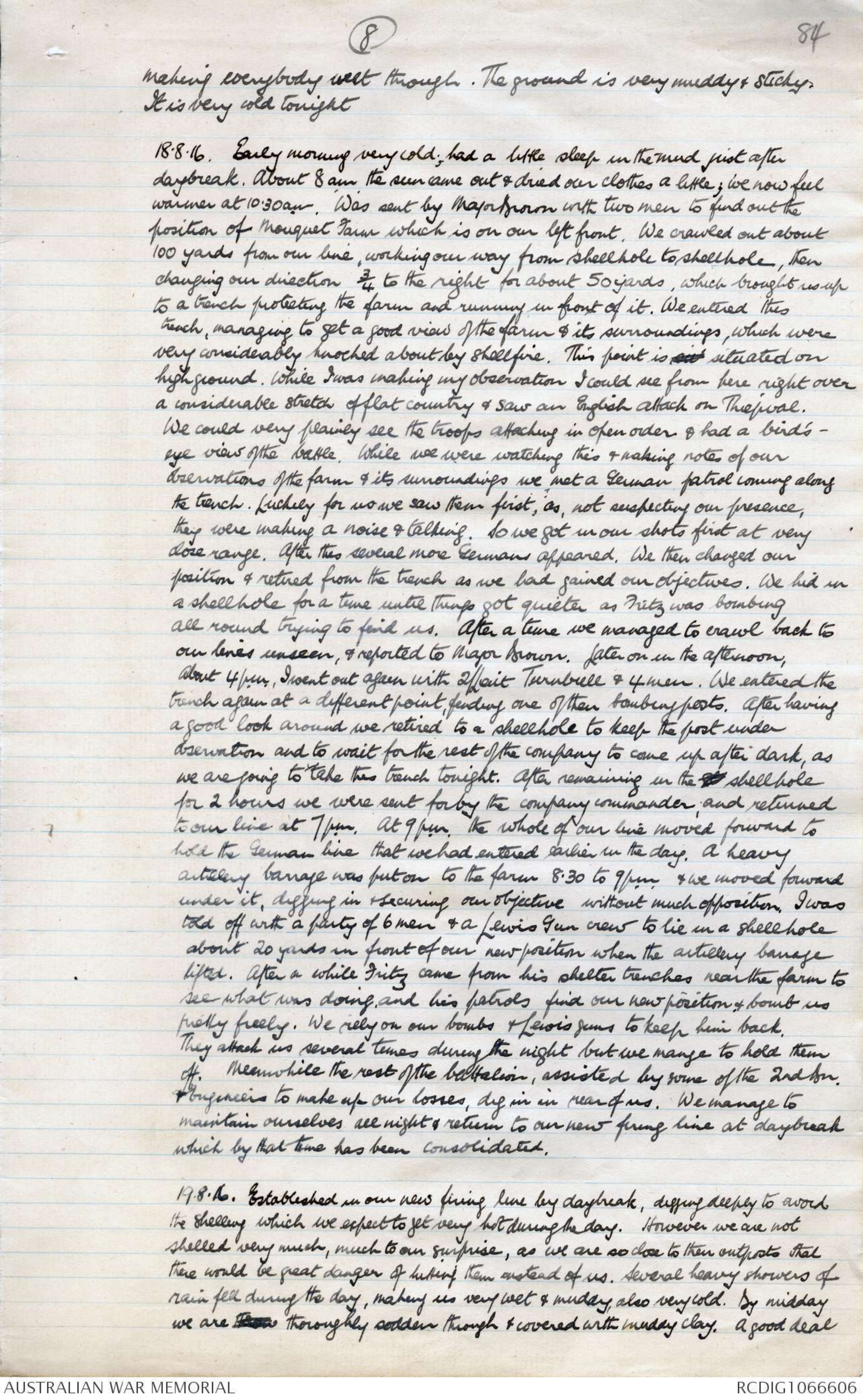
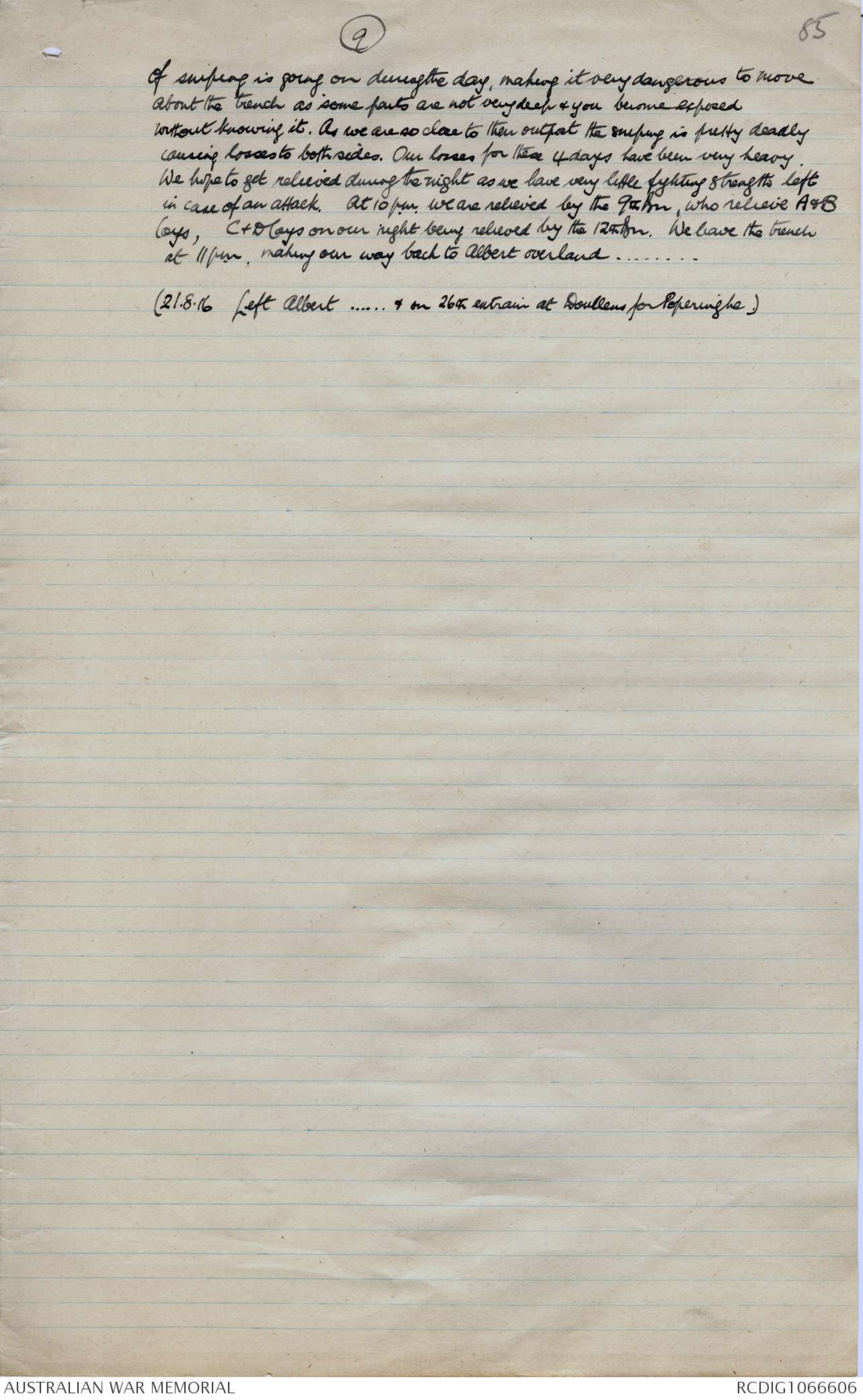
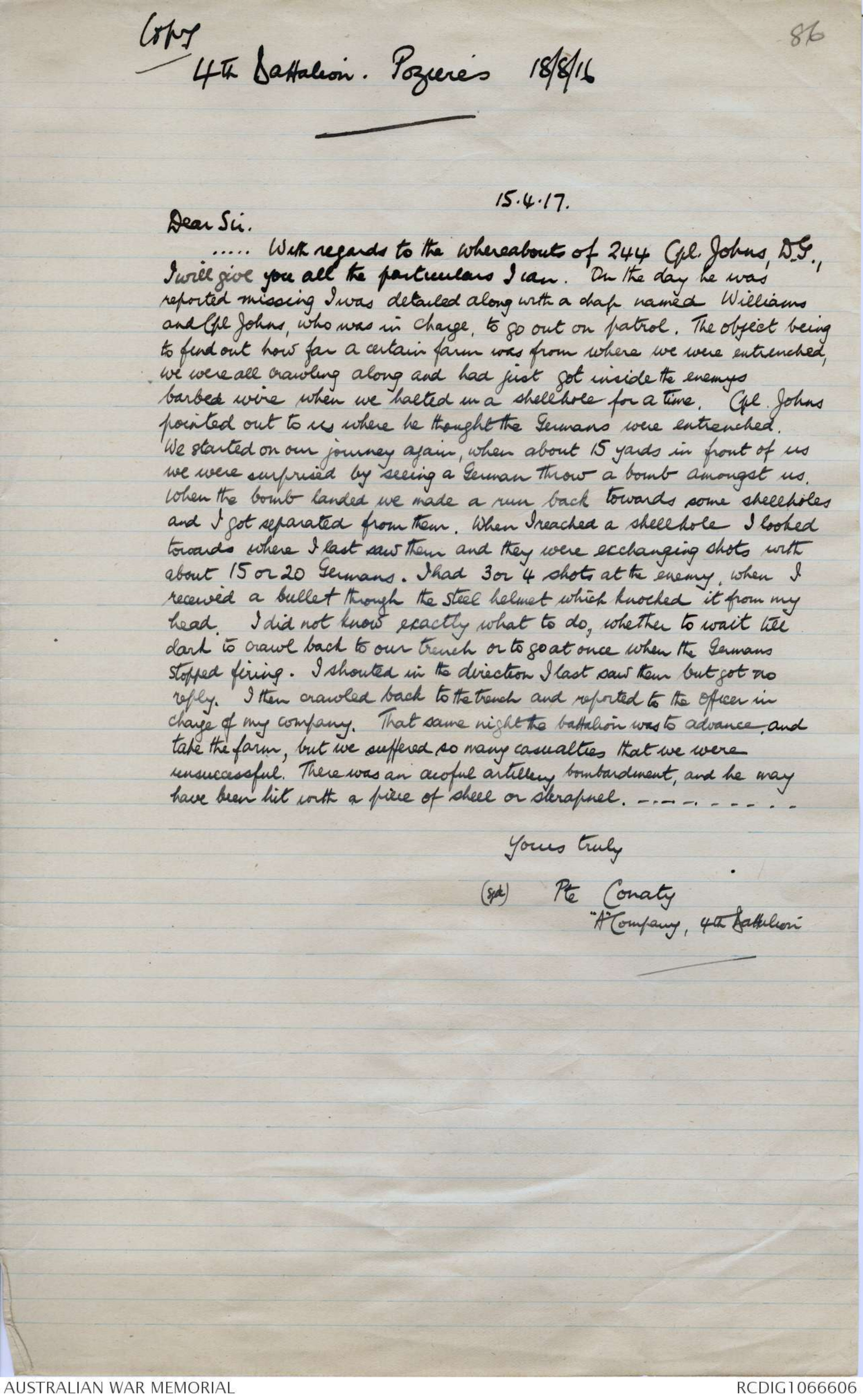
(1) 77
Pozieres
Extracts from diary of Sgt. L. de Vine, "A" Coy, 4th Battalion
9.7.16. Left Sailly today, marched full marching order to Bailleul about 5
miles ........ placed in a billet .... at Outtersteene .....
10.7.16. Early morning physical drill. Parade 9-11, short march; another
parade 2-4 p.m. Told during march by Major Brown that we are on our way to
the Somme Valley where a big push has been going on successfully since the 1st of
the month .. .. .. ..
11.7.16 Reveille 3 a.m. everything packed up, full marching order, left billett at
7 a.m. entraining at Bailleul after loading train with our transport . . . . . . . .
We disentrained at Franvillers-Landos at 2:30 & marched to St Ouen, 9 miles
away, arriving . . . . . very tired & dirty .. .. ..
12.7.16 Received orders suddenly whilst at breakfast to get packed up.
Marched off at 9 a.m. ..... to the next village (Vignacount). . . . . . . .
13.7.16 Parade early morning, physical exercise. Parade ordered for 9 a.m.
Just as we were abt to move off orders came though from the Bde to move off
full marching order by 12. Had a little dinner, moving off at 12 sharp &
marched 10 miles through several villages to Allonville . . . . . . .
14.7.16 Parade 9 a.m. light marching order, route march for 2 hours
We have now to be ready to move at a minute's notice; all our belongings have to be
constantly packed up . . . . . . .
15.7.16 . . . . . All our senior officers leave for the Somme Battlefront, & go to Fricourt
to get an idea of our sector. The firing line is continually moving up as we
attack an objective each day. Only at one point is the advance held up - at
Thiepval, which presents a very difficult situation, as it is very strongly fortified.
16.7.16. Fell in full marching order at 12 ready to move off. We leave at 1 p.m.
& march to Warloy-Baillon about 8 miles away, where we billet for the night.
17.7.16 Early morning parade, & again at 9 a.m, light marching order. At 2 pm
parade to the Divisional Baths. It rained all the afternoon making the roads very
muddy.
18.7.16. Packed up, full marching order, without blankets xxxx by 9 a.m. waiting
orders to move off at a moment's notice. Orders received late in the evening that we are
not leaving today. Day occupied in lecture on the new front and an
explanation of the offensive & the objectives.
19.7.16 Everything packed up again ready to move off at a moments notice. During
the morning overcoats & waterproofs rolled bandolier fashion ready for marching
off in battle order. We move off at midday . . . . . carrying 2 tins of beef, 10
large biscuits, 2 extra bandoliers of cartridges, 2 Mills bombs, 2 sandbags,
1 botte of water, 2 gas helmets carried in haversacks, besides overcoat and
blanket, 1 field dressing, & full fighting equipment. We are now ready for our
first big fight on the Western Front. After an inspection of our equipment we
(2) 78
return to billets for final adjustments and issues of our shortages. At 3pm we
stack our packs at the Bn stores situated in the village - this is the last that we see
of them until we come out of the line. At 5 pm we fall in, full fighting order,
& march away towards the line. We pass through several villages full of
English troops, and arrive at Albert at 8.30 p.m. . . . . . We march direct
through the town, passing the Church. . . . . . . . . We take the Pozieres-Bapaume Road
halting outside Albert for about an hour. Many English regiments pass us who have
been relieved from the front area . . . . . . . They have been very successful and are all
singing as they march along, every man wearing a German helmet. The whole of the
roads are simply packed with troops moving towards or from the forward area.
Everything however seems to work very smoothly, as men are told off to control the
traffic as if they were police. After an hours rest we march on to the old front
line. We are now at La Boisselle & have relieved the 13th Royal Fusiliers . . . . . . . .
It is not long before we are all covered in white chalk, as our trenches are dug out
of the solid chalk. .. .. .. Very many dead are lying about, buried in the wreckage of
their trenches and blown up by the mines . . . . . . There are a few dugouts left
the largest one is a four roomed house, deep underground with a concrete
blockhouse above it .. .. .. .. The fort above although hit several times by our shells,
still is very serviceable and in a fairly good condition. The garrison are all
lying about dead in either the rooms underground or in the "pillbox", probably
killed by Mills bombs. The corridors running from this stronghold run a
considerable distance underground connecting up smaller dugouts. This is the
first complete German system of dugouts that we have yet met, proving to
us what we were told in a lecture the other day in explaining the defences
adopted on this front - apparently there is as much fighting to be done
underground as there is above. The garrison must have contested very
strongly as they are all killed & lying about with our "Tommies" in great
confusion. Some Fritzs are still lying where they were killed in their beds,
being caught before they could get out . . . . . . . . .
We eventually settle down for the night in an old German trench a
long way behind his original line; this is our first sleep in a captured
German trench. Very heavy shelling is going on all night by the guns in front of
us. We only manage to get a very little sleep through such a deafening noise.
Fritz is throwing many tear shells or lachrimatory gas into his old front
line, as he expects that we are occupying it, making the air very heavy with the
smell of gas. Both of my eyes have become inflamed. We all feel it a good
deal for the first time. I got absolutely no sleep during the night, the whole
earth is trembling under the shock of bursting shells & firing cannons. . . . . . .
20.7.16 During the morning we have a good ramble over the captured
position. All trenches & dugouts in the front line were simply blown to pieces,
the destruction has been most complete, no barbed wire left. The artillery cut
it simply by blowing it away, leaving No Mans Land in an awful state
of wreckage, simply covered with shellholes touching one another, showing
clearly that not one yard of ground was overlooked. There are very many
German dead lying about in their battered trenches or in their dugouts
which are in many cases 20 to 30 feet deep & very strongly constructed. . . . . . .
During the day a Fokker plane came over our lines and was engaged by
one of our planes. Our plane was brought down & fell within our lines
badly wrecked. At 8.30 another fight occurred above our lines between
one of our fighting planes & a Taube; this time the Taube fell & smashed up
(3) 79
Within our lines, much to our boys' delight . .... Heavy bombardment continues all
night. Very little sleep.
21.7.16 . . . . . . During the day we are at liberty to do as we like, no fatigues.
We are being well rested before we go into the line, probably in a day or two.
I occupy my time by roaming over the German front line of trenches and
exploring the dugouts, which are very elaborate and are very well furnished
with the furniture taken from neighbouring villages, including a piano. The walls
even were papered, & feather beds installed in the bed rooms. This has evidently been a
headquarters of a battalion that held the line in this sector as it is a complete house
underground, fully furnished, depth about 30 ft underground, & is entered by
descending a concrete manhole with iron steps let into the side & is immensely
strong. Many of our dead are here, also many Germans. They must have put up a
great fight in such a strong position, as each room had to be taken separately.
In this sector there are very many dugouts about 12 to 15 feet deep, leading into
very large rooms with sleeping accom^modation for about 40 to 50 men, who
sleep in tiers of 3, one above the other, arranged as if they were ships bunks.
Under this system of protection from shellfire it is possible to have a very light
garrison only in the line, the remainder remaining under cover only a short
distance away, ready immediately to garrison the line in case of attack.
In most instances they were caught like rats in a trap, as the English attack was
so sudden, & the bombardment so intense, that they had not the time to get out
despite the fact that most of the dugouts had two exits. With the exits in the hands
of the Tommies all they had to do was to use Mills bombs freely, with the result
that all of the dugouts are filled with German dead . . . . . . . .
Had ^a good nights sleep, don't know when or where we will get the next.
22.7.16. Easy day, nothing to do. Everything ready for the advance. . . . . . .
Orders are issued this evening about our advance, position, & objective, which is
the village of Pozieres. Our position is on the Brigade left, in the rear of the 2nd Bn.
Zero hour is to be 12.30, when we pass through the 2nd Bn and attack the
village in the early hours of the morning.
We left our position at La Boisselle at 9.30 p.m. to take up our position in
the forward area. While on our way up to the line, and about 1 mile from it,
we ran into a section of the road under very heavy shellfire, & we have to
run the gauntlet one at a time; and as we have each been given either a
tin of water to carry or a box of 1 dozen Mills grenades, in addition to our
heavy fighting equipment, we find the "going" pretty heavy. I am carrying a
box of bombs, This sector is under exceptionally heavy shellfire, as Fritz
must know that we must all pass this corner to get to the line, & so he has
concentrated several guns on to it. A large number of dead & wounded are
lying about who could not be attended to, owing to this concentrated HE shellfire.
This place is known as "Suicide Corner", and anybody caught in it has little
chance of getting out again, especially if he is badly wounded. It is a case of
everybody for himself; if you get wounded you must crawl out of the
danger zone as best you can. Many of the boys get badly wounded
here and are left behind. I managed to get through all right, despite the
fact that the box of bombs was hit by a shell splinter. We are all
carrying shovels in addition to our very heavy fighting order. Those of us
who have come safely through arrive at our position, opposite to our objective,
which is the village of Pozieres, which is to be stormed and taken by the 1st Brigade,
(4) 80
supported by the rest of the Division. Our R & L. flanks are each held by air
English Division. The front time of trenches opposite to us are to be taken by the
1st & 2nd Bns, the 3rd Bn to take the 2nd line, & the 4th Bn to push on to the
outskirts of the village, where we are to dig in alongside the main road.
Our artillery have been pouring in a very heavy fire all day, which grew very
intense before midnight & lasted until zero, which is 12.30.
23.7.16. Punctually at 12.30 a.m. the Artillery lifted on to the second line,
meanwhile the 1st line was successfully captured by the 1st & 2nd Bns. After a while the
guns again lifted on to the village & the 2rd line was captured. The 4th Bn then
advanced over the two captured positions and passed on to the village, C & D Coys
gaining the objective & digging in, A & B in close support. "A" Coy dug the
communication trench back from the village to the captured trenches behind. The 2nd
Brigade is in reserve. The early hours of the morning are occupied in ratting out the
Germans from their dugouts & cellars in the ruined village, which by now is simply
pounded into dust. But the cellars, for the most part being underground, afford
protection for hundreds of the garrison. We find a large number & a lot of wounded
whom it was not able to take away because of our heavy shelling. By heavy digging
we consolidate the position right through the village. We are not interfered
by any counter shelling during the morning, & we can move about the village
pretty freely. They do not know exactly where their line is & are not shelling
because they may hit some of their own posts which they still occupy at the other
end of the village. Our artillery are not sure of the extent of our advance
and cease shelling for the same reason. At daybreak many of our planes flew
over us trying to pick up our line through the wreckage. We dug hard well into
the morning, realising that as soon as our exact position is found, Fritz will
open out on us with his heavies. Our wounded are carried to some of the deep
dugouts for protection & to await an opportunity of being carried away. - There are
many dugouts inside our lines & we are using them. There are many small guns
knocked out in the village, mostly by direct hits & are badly knocked about.
All of these gun positions have their own dugouts & are all joined together
underground by an elaborate system of tunnelling. Many interesting souvenirs
have been found, such as German helmets, swords, iron crosses, etc. I found
a bugle of one of the Prussian Guard Regts. About midday the guns start again
having found their new ranges, & keep up a heavy bombardment for the rest of
the day on what is left of the ruins - not one single wall remains standing.
Our artillery preparation was so complete yesterday that both the guns that were in the
village, & the village are absolutely blown off the map. The wreckage caused by
both the German shelling & ours is absolute ........... dead English & German
soldiers are lying about the xxx ruins everywhere .. ... .. The shellfire during
the rest of the day is very intense, & is causing us very heavy casualties, but we
are holding on, although sitting down under heavy HE shellfire inactive
is simply awful & very nerve shattering. "A" Coy were sent to a support trench
during the afternoon. The Germans attempted a counter attack during the latter
part of the afternoon, coming up on our left flank to within about 60 yards, but
were repulsed & retired back to 400 yards. "A" Coy reoccupied the firing line
at 8 p.m. as we are expecting an attack. Stood to all night waiting for them
but they did not attack although the shelling has increased considerably,
& is the worst that we have yet experienced. Our casualties are pretty high
& very heavy in D Coy who have suffered most.
(5) 81
24.7.16. Very heavy bombardment of the village all day, much heavier
than yesterday. Fresh guns have been brought up during the night. Most of the
shelling is HE of all calibres, which simply pound our trenches to dust, killing
wounding & burying. Nearly everyone has been buried at least once, & we
are kept busy digging ourselves out of the blown down trench. However
their guns do not shift us from our position in the village. At midnight A & B
Coys relieve C & D Coys in the front line, we relieve D Coy; the coy got lost in
the ruins of the village, finding it quite impossible to recognise any semblance
of our trench, so we waited in shellholes until Major Brown found out
exactly where we were. Very many tear shells are used during the night
and our eyes smart very much. The goggles that have been issued to us are
quite useless, so we have to put up with it. During the night our L. flank
connected up with the English Division, we found the Warwicks. Previous to
this we were not sure of our front & posted men looking both ways. We
mistook the Warwicks for Germans & they mistook us for Germans, hence an
interesting situation. Fortunately the very heavy shelling kept our heads ^well down
otherwise we might have inflicted casualties on ourselves. The whole of the
country at the rear of the trenches that we occupy outside the village
is covered with English dead, due to the fact that they were twice repulsed
in trying to take this position. They must have suffered very heavily, and, as
the fighting has been continuous since, there has been no time to collect them.
Some are in a shocking condition, & the position is fast getting very unhealthy.
Our padre, Major McKenzie, is doing very good work in this connection, attending to
all wounded & burying the dead, both ours & the Tommies.
25.7.16. At 3 a.m. we were taken from the front line & placed on the left of the
village held by the 2nd Bn., & orders were passed to take about 1000 yards
of Kay Trench on the 2nd Bn's left, & so link up across some flat country
with an English Division that are working along a low range of hills
on the left of the position. Supported by the Bn. Lewis Gunners & bombers
we did with few casualties. The Germans were completely surprised while
having their early morning rum & coffee, which we had instead. They
showed very little fight & surrendered in dozens. Many jumped out of
the trench & ran across the open xxx country towards the cemetery. We
captured the trench as far as the cemetery, holding the same easily.
Many Germans hid in shellholes, which provided excellent targets for our
machine guns and snipers. Many were bombed & bayonetted in the
trench when it was taken, leaving the place full of their dead. There were
many very deep dugouts in this section of the trench - one was fitted as an
officers' mess, complete with bar etc & many bottles of rum & other spirits.
During the day their artillery was turned on to us & gave us a pretty bad
time, the shelling was very heavy & continuous. We can see plenty of Germans
running about the country in front of us from time to time, & making a dash
for their trenches from their various shellholes where they have been hiding all day.
The can be seen running along the skyline all day as the Tommies drive them
before their advance, our guns poured plenty of shrapnel on them, getting many.
During the evening we were bombarded with greater intensity than ever, but we
still held on to the trench although it is very considerably knocked about & in some
parts completely flattened out. During the night a reconnoitring patrol found out that
the Warwicks were holding a portion of a trench in front of us towards our left.
Pretty quiet night with no attacks. We are expecting to be relieved during the night.
to be durin
(6) 82
26.7.16 Very heavy & intense artillery action on our trench at intervals
during the day. At 5 pm it grew greater in intensity, killing & burying many
of the men. I got hit on the left elbow with a shell splinter, but not seriously.
We still hold on to our position despite our heavy casualties & have not
retired from any part of the trench captured the previous morning. Hope to get
relieved tonight. Coy. very badly knocked about.
27.7.16 Relieved just before daybreak by the 24th Bn. At 4am we left
our trench and picked our way across the torn up country, now completely filled
with shellholes, to the main road running through Pozieres from Albert. This is
the road we came up on the night of the 22nd. It is now simply covered with our
dead who are lying on either side. This road, being the main communication with
our forward positions, is under continuous HE fire, inflicting very heavy
casualties on all users of the road. Many battalions have had to run the
gauntlet, each leaving their dead where they fell, & now they have
accumulated to very large numbers. We slowly & in small groups make our
way to La Boisselle to collect the remnants of the battalion, who are all
making for that point. After waiting for some little time for the rest, we
leave for Mametz Wood where we are given a mug of hot coffee.
Afterwards we march through Albert to the brickfields on the other side
of the town, where our transport are waiting for us. We camped there for the
rest of the day, lying down on the ground sleeping by companies. We all
feel completely knocked out, & glad of the opportunity to take our boots off
& to get some sleep, neither of which I have had since the 22nd. We sleep
for the rest of the day, resting ourselves, we feel much fresher. Later in the
afternoon at 4pm, we pack up & move off, marching further back to Warloy
We pass through the village & bivouac in a wood between Warloy & Contay
at the village of Vadencourt where we are placed in huts & tents for the
night. This place is called "Blighty Wood".
(Battalion reaches Halloy-les-Pernois on 30th, where it is in rest billets until
Aug. 9.)
9.8.16 Under orders to move off full marching order at 9 a.m. Marched for 3
hours to La Vicogne, sleeping for the night under the trees of the orchard . . . . . .
Very cold without any blankets. When we wake up in the morning it is
raining steadily. It is pretty wet & cold. We are now on our way back to the
trenches again . . . . .
10.8.16 Packed up for marching off at 9 a.m. The roads are very muddy.
Arrive Herissart at 12 where we are placed in billets for the night.
We may be here for a few days. . . . . . . .
13.8.16. Full brigade parade in a field through the village. General
Birdwood attended the church parade which was held first, then distributed
MC & D.C.M. ribbons to the winners of distinctions, afterwards making a long
speech congratulating us on our work at Pozieres etc. After giving three
cheers for Gen. Birdwood we returned to our billets . . . . .
14.8.16 . . . . . . Fall in & march off at 2.30 p.m. As we marched off, a
heavy shower of rain commenced & as no one was wearing an
(7) 83
overcoat we all got pretty wet. We marched to Vadencourt Wood & occupied
the same huts that we had on the night of the 22 27/7/16 . . . . . . .
15.8.16 Left our camp full marching order at 830 a.m. & marched direct to
Albert arriving there at midday. After resting in a field for about an hour
or two I went into Albert to the BEF canteen to buy some things, especially
chocolate to take into the line when we go. I arrived back at our bivouac
just in time to find the battalion under orders to move off in half an hours'
time. Just had time to get myself into battle order, when we had to fall in without
even getting any rations, the orders came very suddeny. It is now raining very
heavily & we are wearing our WP sheets without overcoats, which we leave in our
packs with the transport. We march of at 3.30 p.m. without anything to eat, as we
have no time, although a hot dinner has been prepared in the Coy. cookers.
A & B Coys with half the Lewis Gunners & bombers move off and march through
Albert towards Pozieres . . . . . . . . . We relieve the 50th Bn & are being continually
shelled all night. No infantry attacks. C & D Coys will eventually relieve the
51st Bn on our right, thus making our battalion front continuous.
16.8.16 Managed to get a good view at daylight of the surrounding country
which is simply a mass of shellholes and ruins all jumbled up in a mass
of wreckage. The shells have fallen so closely & thickly that there is not a
yard of country that is not blown up. We are only in a very rough trench
which is continually being shelled, thus breaking it up. Large shells are now
constantly falling on some part of it, blowing it in & burying the occupants. We
cannot very well make out the German line as their trenches etc have been
so very much knocked about by our shellfire that all the country around
looks the same. All we know is that they are holding a line of shellholes
and portions of a battered trench very close to our front. However they keep
pretty quiet all day, hardly firing a shot; but their artillery is very active,
continually searching over the ground & reploughing it up with heavy HE
shells. We have an exciting night, being attacked on our left. We stood to all
night & had many alarms but they did not attack on our coy. front. There is
continuous heavy shelling throughout the night.
17.8.16. Artillery not very active during the morning. We have had many
casualties during the night from the shelling which was pretty constant.
Saw several of our aeroplanes engaging German Fokkers over our lines during
the day, - One German burst into flames & fell just over a ridge on our left.
Before he fell the tail of the machine fell off & the machine gun ammunition
exploded, causing him to fall a mass of flame. The shelling was pretty
constant during the afternoon. During the evening the coy. moved further up the
trench, about 500 yds to our left. This was caused by A Coy of the 3rd
relieving our D Coy, causing it to move farther to the left, bringing ours up to a
Quarry, & in front of Mouquet Farm. As soon as it was dark we swung our left
flank round nearer to the farm and started to dig a new firing line about 100
yards in front of our old one, so straightening up the line. This was done during the
hours of darkness and under shellfire all the time. I was detailed with two(?) men
to act as a covering party and lie out in a shellhole all night in front of our new
trench, to give the alarm of any German patrol approaching. We did not see any,
Several large shells fell near us, but we managed to get back all right just
before daybreak. Several short showers of rain fell during the day & night
(8) 84
making everybody wet through. The ground is very muddy & sticky;
It is very cold tonight
18.8.16. Early morning very cold; had a little sleep in the mud just after
daybreak. About 8 a.m. the sun came out & dried our clothes a little; we now feel
warmer at 10.30 a.m. Was sent by Major Brown with two men to find out the
position of Mouquet Farm which is on our left front. We crawled out about
100 yards from our line, working our way from shellhole to shellhole, then
changing our direction ¾ to the right for about 50 yards, which brought us up
to a trench protecting the farm and running in front of it. We entered this
trench, managing to get a good view of the farm & its surroundings, which were
very considerably knocked about by shellfire. This point is sut situated on
high ground. While I was making my observation I could see from here right over
a considerable stretch of flat country & saw an English attack on Thiepval.
We could very plainly see the troops attacking in open order & had a
bird's-eye view of the battle. While we were watching this & making notes of our
observations of the farm & its surroundings we met a German patrol coming along
the trench. Luckily for us we saw them first, as, not suspecting our presence,
they were making a noise & talking. So we get in our shots first at very
close range. After this several more Germans appeared. We then changed our
position & retired from the trench as we had gained our objectives. We hid in
a shellhole for a time until things got quieter as Fritz was bombing
all round trying to find us. After a time we managed to crawl back to
our lines unseen, & reported to Major Brown. Later on in the afternoon,
about 4 p.m., I went out again with 2/Lieut Turnbull & 4 men. We entered the
trench again at a different point, finding one of their bombing posts. After having
a good look around we retired to a shellhole to keep the post under
observation and to wait for the rest of the company to come up after dark, as
we are going to take this trench tonight. After remaining in the xx shellhole
for 2 hours we were sent for by the company commander; and returned
to our line at 7 p.m. At 9 p.m. the whole of our line moved forward to
hold the German line that we had entered earlier in the day. A heavy
artillery barrage was put on to the farm 8.30 to 9 p.m. & we moved forward
under it, digging in & securing our objective without much opposition. I was
told off with a party of 6 men & a Lewis Gun crew to lie in a shellhole
about 20 yards in front of our new position when the artillery barrage
lifted. After a while Fritz came from his shelter trenches near the farm to
see what was doing, and his patrols find our new position & bomb us
pretty freely. We rely on our bombs & Lewis guns to keep him back.
They attack us several times during the night but we mange to hold them
off. Meanwhile the rest of the battalion, assisted by some of the 2nd Bn.
& Engineers to make up our losses, dig in in rear of us. We manage to
maintain ourselves all night & return to our new firing line at daybreak
which by that time has been consolidated.
19.8.16. Established in our new firing line by daybreak, digging deeply to avoid
the shelling which we expect to get very hot during the day. However we are not
shelled very much, much to our surprise, as we are so close to their outposts that
there would be great danger of hitting them instead of us. Several heavy showers of
rain fell during the day, making us very wet & muddy, also very cold. By midday
we are then thoroughly sodden through & covered with muddy clay. A good deal
(9) 85
of sniping is going on during the day, making it very dangerous to move
about the trench as some parts are not very deep & you become exposed
without knowing it. As we are so close to their outpost the sniping is pretty deadly
causing losses to both sides. Our losses for these 4 days have been very heavy.
We hope to get relieved during the night as we have very little fighting strength left
in case of an attack. At 10 p.m. we are relieved by the 9th Bn, who relieve A & B
Coys, C & D Coys on our right being relieved by the 12th Bn. We leave the trench
at 11 p.m. making our way back to Albert overland . . . . . . . .
(21.8.16 Left Albert . . . . . . & on 26th entrain at Doullens for Poperinghe.)
86
Copy
4th Battalion. Pozieres 18/8/16
15.4.17.
Dear Sir.
. . . . . With regards to the whereabouts of 244 Cpl. Johns, D.G.,
I will give you all the particulars I can. On the day he was
reported missing I was detailed along with a chap named Williams
and Cpl Johns, who was in charge, to go out on patrol. The object being
to find out how far a certain farm was from where we were entrenched,
we were all crawling along and had just got inside the enemys
barbed wire when we halted in a shellhole for a time. Cpl. Johns
pointed out to us where he thought the Germans were entrenched.
We started on our journey again, when about 15 yards in front of us
we were surprised by seeing a German throw a bomb amongst us.
When the bomb landed we made a run back towards some shellholes
and I got separated from them. When I reached a shellhole I looked
towards where I last saw them and they were exchanging shots with
about 15 or 20 Germans. I had 3 or 4 shots at the enemy, when I
received a bullet through the steel helmet which knocked it from my
head. I did not know exactly what to do, whether to wait till
dark to crawl back to our trench or to go at once when the Germans
stopped firing. I shouted in the direction I last saw them but got no
reply. I then crawled back to the trench and reported to the Officer in
charge of my company. That same night the battalion was to advance, and
take the farm, but we suffered so many casualties that we were
unsuccessful. There was an awful artillery bombardment, and he may
have been hit with a piece of shell or shrapnel. -. -.-. - - - -
Yours truly
(sgd) Pte Conaty
"A" Company, 4th Battalion
 Deb Parkinson
Deb ParkinsonThis transcription item is now locked to you for editing. To release the lock either Save your changes or Cancel.
This lock will be automatically released after 60 minutes of inactivity.